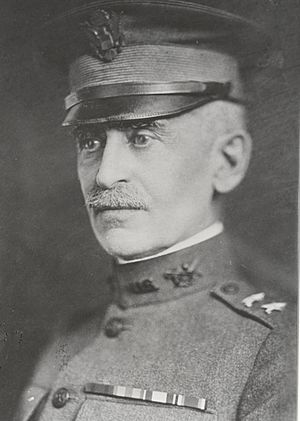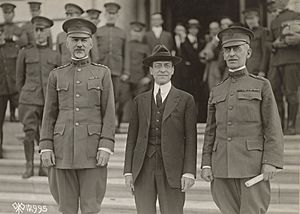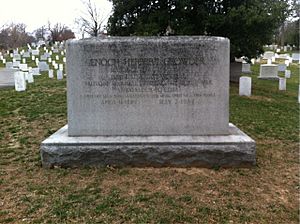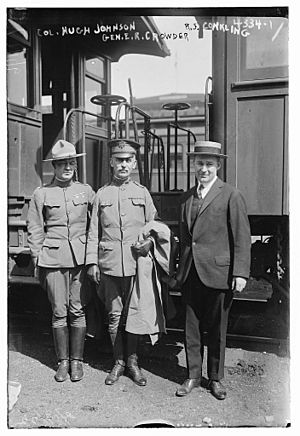Enoch Crowder facts for kids
Quick facts for kids
Enoch Herbert Crowder
|
|
|---|---|

Major General Enoch Herbert Crowder
13th Judge Advocate General of the United States Army |
|
| Born | April 11, 1859 Edinburg, Missouri |
| Died | May 7, 1932 (aged 73) Washington, D.C. |
| Resting Place | |
| Allegiance | |
| Service/ |
|
| Years of service | 1881–1923 |
| Rank | |
| Service number | 0-10 |
| Commands held | Judge Advocate General |
| Battles/wars | American Indian Wars Spanish–American War Russo-Japanese War World War I |
| Awards | |
Major General Enoch Herbert Crowder (born April 11, 1859 – died May 7, 1932) was an important American Army lawyer. He served as the main legal advisor for the United States Army from 1911 to 1923. Crowder is best known for creating and managing the Selective Service Act of 1917. This law helped draft thousands of American men into the military during World War I.
Contents
Early Life and Military Training
Enoch Crowder was born in Edinburg, Missouri, in 1859. He was a very smart student. After finishing Grand River College at age 16, he taught in local schools. His mother, Mary Crowder, encouraged him to apply to the United States Military Academy (USMA) in West Point, New York.
Becoming an Army Officer
Crowder started at West Point in 1877 and graduated in 1881. As a young officer, Lieutenant Crowder joined the 8th Cavalry Regiment in Brownsville, Texas. While there, he studied law and became a licensed lawyer in Texas in 1884. That same year, he moved to Jefferson Barracks Military Post in Missouri.
In 1885, Lieutenant Crowder became a Professor of Military Science at the University of Missouri. He taught military skills to students. He also started the first ROTC cadet band in the United States. This band later became famous as Marching Mizzou. While at the university, he earned another law degree in 1886. Soon after, he was promoted to First Lieutenant. He then rejoined his regiment for the Geronimo campaign against Native American leader Geronimo. After this campaign ended in September 1886, he went back to teaching at the University of Missouri until 1889.
A Career in Military Law
After his teaching job, Lieutenant Crowder returned to the 8th Cavalry. He took part in the final campaign against Sitting Bull. In 1891, he was promoted to captain. He then became the acting Judge Advocate General (chief lawyer) for the Department of the Platte in Omaha, Nebraska. In 1895, this temporary legal role became permanent, and Crowder was promoted to major.
Serving in the Spanish-American War
When the Spanish–American War began, Crowder was promoted to lieutenant colonel. From 1898 to 1901, he served in the Philippines. He worked as a judge advocate, which means he handled legal matters for the military. He also became secretary to the island governors, including Arthur MacArthur Jr.. Crowder helped arrange the Spanish surrender of the Philippines. He held many important legal jobs in the military government there. He specialized in military law. In 1899, he led the Board of Claims, served on the Philippine Supreme Court, and wrote the new criminal laws for the Philippines.
While in the Philippines, Crowder impressed Governor General William Howard Taft with his legal skills. Taft asked Crowder to advise the Vatican's lawyer about transferring "friars' lands" to Filipino citizens. This was an effort to help Filipinos own their own land.
Legal Work Around the World
In 1901, Crowder was called to Washington, D.C., to be the deputy judge advocate general. He helped with a famous legal case called the Deming case in 1902. He also joined the general staff and became a colonel. During the Russo-Japanese War of 1904–1905, he was the main American observer with the Japanese Army. From 1906 to 1909, he worked in Cuba. He oversaw the Cuban elections in 1908 and helped write new laws for Cuba.
In 1910, he represented the United States at a conference in Buenos Aires. He also visited Chile, Peru, Ecuador, Colombia, and Panama. On February 11, 1911, after studying military justice systems in France and England, he returned to Washington. He was promoted to brigadier general and became the Judge Advocate General of the United States Army. He held this important position for 12 years.
As Judge Advocate General, General Crowder made many improvements. He started regularly publishing legal opinions. He also published a new guide to all legal opinions since 1862. He created a program to help military officers get legal education. He also oversaw the first major update to the Articles of War (military laws) since 1874. He revised the Manual for Courts-Martial and worked to improve army prisons.
Leading the Selective Service Act
On April 6, 1917, the United States officially joined World War I. As the Army's Provost Marshal (chief of military police), Crowder led the effort to write the Selective Service Act. This law was passed by Congress in May 1917. General Crowder was in charge of the entire Selective Service System. He supervised the draft, which meant registering, classifying, and bringing all American men aged 18–30 into the armed forces. Over 2,800,000 men were drafted during the war.
Many officers worked under General Crowder during this time. These included Major Hugh S. Johnson and Major Cassius Dowell. In 1918, General Crowder was offered a promotion to lieutenant general. However, he refused it because he wanted a field command instead of a desk job.

In October 1917, Crowder was promoted to major general. As Judge Advocate General, he oversaw military justice. The number of serious military court cases (general courts-martial) grew from 6,200 in 1917 to over 20,000 in 1918. In 1918, the office of Secretary of War Newton D. Baker issued the "work or fight" order. Crowder was responsible for making sure this order was followed. It meant that almost every activity in the country had to support the war effort. Crowder also made sure that the United States followed the laws of war for German prisoners. He worked to limit military law to only uniformed soldiers.
On September 26, 1918, news reports showed that military camps were being hit hard by the Great Influenza Pandemic. Because of this, Crowder canceled the military draft calls for October.
He also wrote a book called The Spirit of Selective Service.
After World War I
After the war, General Crowder and the military justice system faced criticism. People said the system was "un-American." Crowder had already started working on reforms. He quickly sped up his efforts. He suggested many changes to Congress, and most of them were adopted. These changes included better protections for those accused in military courts. They also changed how special courts-martial worked. The President was also given the power to change or reverse any court-martial sentence that was found to be wrong.
Ambassador to Cuba

In 1919, Cuban President Menocal invited Crowder to Cuba. He wanted Crowder's advice on updating election laws that Crowder had helped write years before. Crowder stayed in Cuba for several years as the U.S. Special Representative of the President. He pushed for reforms and appointments in President Alfredo Zayas's government. This happened before a U.S. bank would give a very important loan to Cuba. Once the loan was made, Zayas undid many of those reforms.
Crowder retired from the army on February 14, 1923. On the same day, he was appointed the first Ambassador from the United States to Cuba. He held this position until 1927.
Retirement and Death
From 1927 until his death in 1932, General Crowder worked as a private lawyer in Chicago. He died in Washington, D.C., on May 7, 1932. He was buried at Arlington National Cemetery.
Awards and Honors
Enoch Crowder received many awards and honors for his service. These included the Distinguished Service Medal from the U.S. Army. He also received the Cuban Order of Carlos Manuel de Cespedes and the Japanese Order of the Rising Sun. He was also named Knight Commander of the British Order of St. Michael and St. George. Other honors included Commander of the Legion of Honor and Commander of the Italian Order of the Crown.
Legacy
Enoch H. Crowder's service to his country is remembered in his home state of Missouri. A state park is named in his honor. Also, a World War II training center in Neosho, Missouri, was named Camp Crowder. The ROTC building at the University of Missouri, Crowder Hall, is also named after him.
See also
- Fort Crowder (also known as Camp Crowder)
- Crowder College (built on the grounds of the fort)
- Crowder State Park
 | Calvin Brent |
 | Walter T. Bailey |
 | Martha Cassell Thompson |
 | Alberta Jeannette Cassell |


